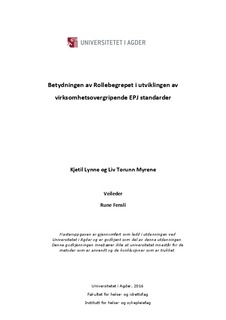| dc.description.abstract | The current offer of health care services shows that patients receive services from multiple health care providers within diagnostic procedures, treatment and follow-up care. Consequently, this entails that health care personnel across the board require access to updated information on the patient in order to provide health care. Today each health care establishment keep separate electronic health records (EHR) to which only their own employees have access. In addition, most establishments have individually adapted their records in relation to structure, access control and roles. Moving forward the goal is to provide a mutual access between health care actors into patient records, as well as standardizing the content of the records. In the EHR health personnel are categorized based on their role, for instance nurse or doctor, and this role is currently the basis for providing access to the part of the EHR relevant to them. This master thesis has examined the term “role” and its significance when the goal is standardized EHR and cooperation across different establishments. A pre-analysis has been conducted, reaching out to several individuals with extensive knowledge of the subject, in order to map possible challenges. Thesis statement: What is the impact of roles when developing standards in EHR, with focus being on cooperation and access across different health care establishments? A qualitative method has been applied in order to answer this statement, along with eight semi-structured interviews with a strategic selection of informants. Results indicate that there is unevenness in the progress of standardization when looking at county health care and specialized health care. It cannot be concluded that standardized roles are conclusive to the cooperation and access across establishments. Most informants expressed that this would be an advantage, however to what degree will depend on, amongst other things, what the basis of the access to the EHR is. Possibly, it could be more significant to define roles in relation to the patient, than roles as a user of the EHR. In addition, this thesis has made visible the challenges related to a broad, cooperative access, especially from the country health care providers. Several of these concerns are theoretically supported. Taking these challenges into account and conducting a thorough analyses, could be crucial for the implementation of access across establishments. Keywords: Electronic health records, role, access control, standardization | nb_NO |
